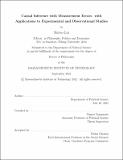Causal Inference with Measurement Errors: with Applications to Experimental and Observational Studies
Author(s)
Liu, Shiyao
DownloadThesis PDF (1.079Mb)
Advisor
Yamamoto, Teppei
Terms of use
Metadata
Show full item recordAbstract
Measurement errors cause problems in causal inference. However, except for canonical cases, researchers rarely realize the existence of measurement errors in their studies. As a result, they sometimes fail to adjust for them. By combining tools drawn from the literature on machine learning, causal inference, and measurement errors, this dissertation illustrates the existence of measurement errors in these seemingly unrelated scenarios and further develops new frameworks and methods to mitigate their impacts on causal estimations.
The first chapter shows that the inability of investigators to fully observe the treatment take-up status of a respondent in an experiment is equivalent to a measurement error for the treatment indicator. Such errors prevent researchers from a correct estimation for average treatment effects. The new framework considers whether a unit is a complier as a latent variable, and subsequently estimates the probability of a respondent being a complier with a Gaussian mixture model, such that researchers can recover the treatment effect despite the measurement error.
The second chapter is motivated by the fact that the estimation of causal quantities with the treatment variable predicted by a machine-learning model is problematic because the prediction error will translate into a measurement error. Under the overarching theme of measurement errors, this chapter develops new methods to mitigate the bias caused by these errors on causal estimation and show the effectiveness of these methods via simulations and validation examples.
The third chapter, by adopting a data-driven theory discovery technique, proposes the hypothesis that the local government in China is more likely to respond if the petitioner sends a credible signal to the government that she is an insider. It further tests this hypothesis with an active-labeling-enhanced semi-supervised learning algorithm as proposed in this dissertation.
Date issued
2021-09Department
Massachusetts Institute of Technology. Department of Political SciencePublisher
Massachusetts Institute of Technology